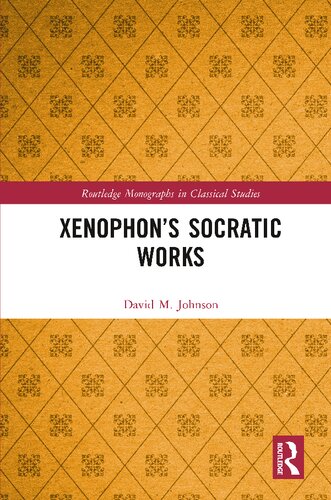

Most ebook files are in PDF format, so you can easily read them using various software such as Foxit Reader or directly on the Google Chrome browser.
Some ebook files are released by publishers in other formats such as .awz, .mobi, .epub, .fb2, etc. You may need to install specific software to read these formats on mobile/PC, such as Calibre.
Please read the tutorial at this link: https://ebookbell.com/faq
We offer FREE conversion to the popular formats you request; however, this may take some time. Therefore, right after payment, please email us, and we will try to provide the service as quickly as possible.
For some exceptional file formats or broken links (if any), please refrain from opening any disputes. Instead, email us first, and we will try to assist within a maximum of 6 hours.
EbookBell Team

5.0
88 reviewsXenophon’s Socratic Works demonstrates that Xenophon, a student of Socrates, military man, and man of letters, is an indispensable source for our understanding of the life and philosophy of Socrates.
David M. Johnson restores Xenophon’s most ambitious Socratic work, the Memorabilia (Socratic Recollections), to its original literary context, enabling readers to experience it as Xenophon’s original audience would have, rather than as a pale imitation of Platonic dialogue. He shows that the Memorabilia, together with Xenophon’s Apology, provides us with our best evidence for the trial of Socrates, and a comprehensive and convincing refutation of the historical charges against Socrates. Johnson’s account of Socrates’ moral psychology shows how Xenophon’s emphasis on control of the passions can be reconciled with the intellectualism normally attributed to Socrates. Chapters on Xenophon’s Symposium and Oeconomicus (Estate Manager) reveal how Xenophon used all the literary tools of Socratic dialogue to defend Socratic sexual morality (Symposium) and debate the merits and limits of conventional elite values (Oeconomicus). Throughout the book, Johnson argues that Xenophon’s portrait of Socrates is rich and coherent, and largely compatible with the better-known portrait of Socrates in Plato. Xenophon aimed not to provide a rival portrait of Socrates, Johnson shows, but to supplement and clarify what others had said about Socrates. Xenophon’s Socratic Works, thus, provides readers with a far firmer basis for reconstruction of the trial of Socrates, a key moment in the history of Athenian democracy, and for our understanding of Socrates’ seminal impact on Greek philosophy.
This volume introduces Xenophon’s Socratic works to a wide range of readers, from undergraduate students encountering Socrates or ancient philosophy for the first time to scholars with interests in Socrates or ancient philosophy more broadly. It is also an important resource for readers interested in Socratic dialogue as a literary form, the trial of Socrates, Greek sexual morality (the central topic of Xenophon’s Symposium), or Greek social history (for which the Oeconomicus is a key text).